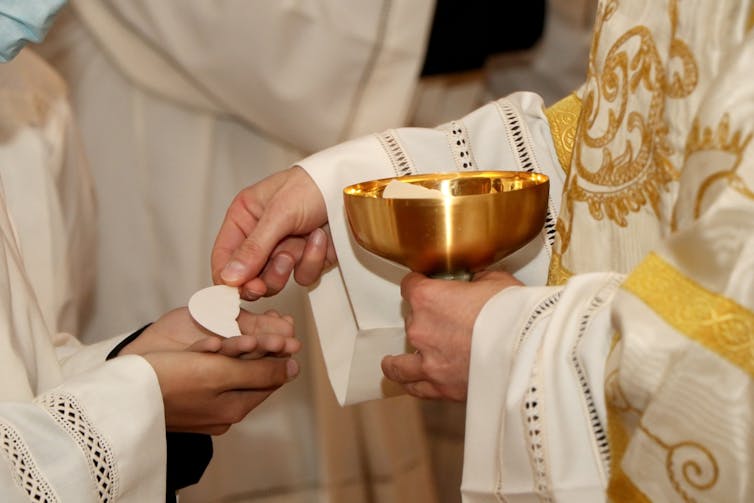"The blood of Jesus is my vaccine" study one of the crucial signs at a contemporary protest towards lockdown regulations in Sydney. while our tendency could be to roll our eyes at such ridiculous anti-science views, these sentiments have an extended and sophisticated history in the Christian lifestyle.
On social media platforms, a small number of Christians are providing a pastiche of biblical symbols to hyperlink the idea of Jesus's blood and insurance policy. in one video, a person claims we comprehend the blood of Jesus will give protection to Christians within the twenty first century from COVID because the blood of the Passover lamb covered the Israelites in Egypt (Exodus 12). As an analogy, it is a stretch.
Kolina Koltai, a vaccine misinformation researcher with the tuition of Washington's center for an recommended Public, aspects out that attractive to people's beliefs and values in spreading vaccine misinformation is primarily effective. Such views will also be extremely complicated to combat, as a result of doing so is perceived as an assault on a person's core beliefs.
while for some, Jesus's "blood" is spiritually invoked through prayer, different misinformation hyperlinks the protective energy of Jesus greater explicitly to taking communion (or the Eucharist). Taking communion day by day, such americans declare, prevents you from getting ailing from COVID.
Communion is a Christian ritual through which token quantities of bread and wine are consumed to bear in mind Jesus's closing meal together with his disciples earlier than demise on a go. whereas distinctive Christian traditions cling lots of theological views, on the heart of communion is the thought that bread and wine are ritually shared as a means to spiritually connect, to have "communion", with Jesus and with one a different. The bread symbolises Jesus's body and the wine his blood. drinking communion wine then is consuming the blood that saves, based on these fringe views.
Melbourne Anglican priest Peter French advised me that, during the past year, he has had to refuse requests from americans who want to buy communion bread and wine from his church within the belief that taking it every day will prevent them from contracting COVID. Anglicans, we may still be aware, do not train that communion will protect you from affliction and the Archbishop of Canterbury has urged people to be vaccinated.
examine more: God, plagues and pestilence – what historical past can teach us about dwelling via a pandemic
The association of the Eucharist and curative had been around lengthy before COVID. In 2013, Pope Francis addressed precisely this problem in a sermon mentioning the Eucharist is not a "magic rite", however a method to come across Jesus.
the place does this affiliation of communion and healing come from? Nowhere explicitly, yet the Christian culture has a long affiliation of communion and fitness metaphors.
within the 2d century, Bishop Ignatius wrote the Eucharist is the "medication of immortality" and the "antidote" to dying. Ignatius's "drugs" is one which brings eternal lifestyles as opposed to freedom from physical struggling.
within the third century, Bishop Cyprian claimed the blood of Jesus has pharmacological benefits, being "fitness-giving" and sophisticated to the benefits of average wine. The medicinal effects of wine were extensively established in antiquity, frequently being a safer drink than water. but here we now have Christians claiming anything extra for the wine that represents Jesus's blood, besides the fact that their claim continues to be primarily a spiritual one.
 in the Christian church buildings, taking communion is a way to be closer to Jesus, now not a magical remedy for COVID. Shutterstock
in the Christian church buildings, taking communion is a way to be closer to Jesus, now not a magical remedy for COVID. ShutterstockAndrew McGowan, professor at Yale Divinity faculty, has written considerably on the background of the Eucharist. He says:
The Eucharist is always an enacted sign of the love and regard for neighborhood proven with the aid of Jesus, not a talisman for private profit or improvement.
during this sense, it is only like the vaccine in that it exists for the first rate of the whole neighborhood, not ourselves as people.
McGowan notes there are more early Christians studies indicating that wrongly taking the Eucharist might do you harm than there are ones suggesting communion will deliver curative. In a few publish-biblical apocryphal sources, bread and wine are shared after a curative miracle as a method of thanksgiving and confirming faith, but it does not deliver physical curative.
in a similar way today, communion is consistently administered to the ill or loss of life. It serves as a reminder of Jesus's salvific action to people of faith, now not as a magic tablet or curative potion.
indeed, common Christian churches constantly anoint the sick with oil for curative or have other prayers for curative that do not contain communion. youngsters, you may see how superstitious ideas developed linking healing from disease to the body and blood of Jesus. To achieve this is to conflate religious well-being and physical fitness. whereas non secular fitness can correlate with different kinds of health (mental, physical), it is not the identical issue.
study extra: Pray, however live away: keeping on to faith in the course of coronavirus
The immense majority of spiritual leaders are urging people to be vaccinated. No severe Christian teaches that taking communion will magically offer protection to someone against illness.
Yet, the road between taking the Eucharist (the blood of Jesus) for non secular wholeness and taking it as a magical potion a good way to protect one bodily continues to be skinny adequate to be abused by irresponsible people touting conspiracy theories.
To do so is preying on the inclined, a most anti-Christian undertaking in the guise of religion.



No comments:
Post a Comment